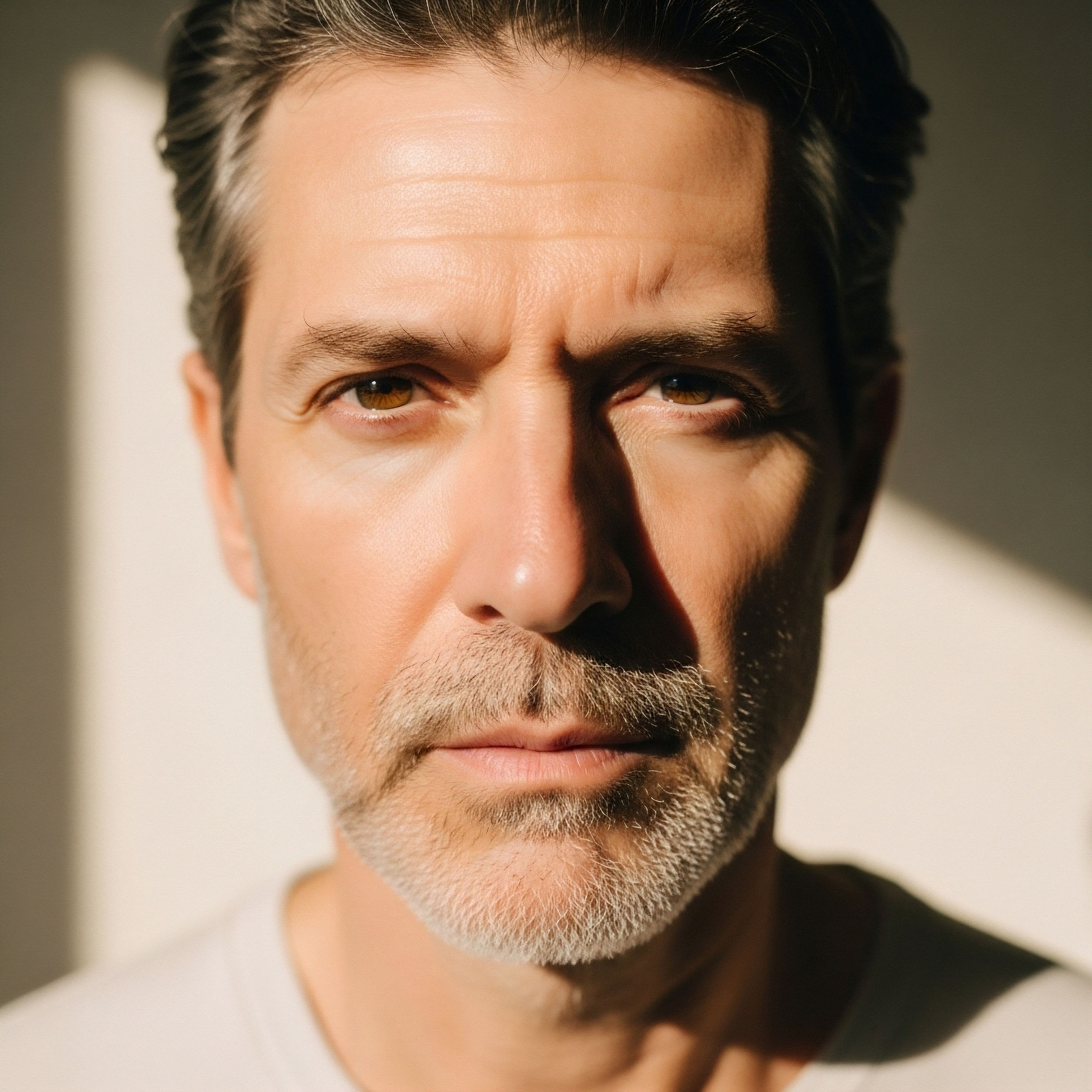

Why Your Body’s Alarm System Is Costing You Your Prime
You feel it. A subtle drag on your morning focus. The stubborn layer of fat that won’t yield, no matter how disciplined your diet. That persistent sense of running on a low-grade hum of anxiety. These are not random signals of getting older. They are data points indicating a systemic misalignment.
For years, you’ve been told to “manage stress.” This advice is flawed because it positions you as a passive recipient of biological events. The real objective is to take decisive control over the primary agent orchestrating this response ∞ cortisol.
Your body’s stress response was engineered for acute, life-threatening events, not the chronic, low-grade pressure of modern existence. When the cortisol rhythm is perpetually disrupted, it degrades your performance from the inside out. This hormonal signal, when dysregulated, actively works against your goals.
It can impair muscle recovery, encourage fat storage, particularly around the midsection, and cloud cognitive function. Chronically elevated cortisol doesn’t just make you feel tired; it actively dismantles the architecture of your vitality. Taking command of it is the first principle of building a superior biological framework.
Your energy, focus, and physique are dictated by hormonal signals you can learn to command.
Moving beyond the passive language of “management” is the critical first step. You are not meant to simply cope with the signals your body sends. You are meant to interpret them, understand the system producing them, and then adjust the inputs to generate a better output. This is about shifting from a defensive posture to an offensive strategy. Commanding cortisol means you dictate the terms of your energy and performance. It is the foundational layer of proactive health optimization.


Recalibrating the Cortisol Operating System
Think of your cortisol rhythm as your body’s core operating system. It has a factory setting ∞ a sharp peak in the morning to drive alertness and a slow taper throughout the day, reaching its lowest point for deep, restorative sleep. Chronic stress corrupts this code, leaving the system running erratically.
Recalibration involves sending clear, powerful signals to the Hypothalamic-Pituitary-Adrenal (HPA) axis ∞ the command center for cortisol production ∞ to restore its intended function. This is achieved not through supplements or complex machinery, but through the precise timing of fundamental inputs.
The process is about leveraging light, movement, and nutrition as tools to rewrite your daily hormonal script. These are the levers you pull to architect a superior internal environment. Mastering this system requires understanding its key principles and executing them with consistency.

The Pillars of Hormonal Recalibration
A disciplined approach to your daily inputs provides the clearest signals to your internal systems. Each action either reinforces a performance-oriented rhythm or contributes to chaotic signaling. The choice determines your biological state.
- Light as a Trigger Getting direct sunlight within the first hour of waking is a non-negotiable command. This potent stimulus helps anchor your circadian clock, ensuring a robust morning cortisol peak that promotes daytime alertness and sets the stage for a proper decline later.
- Movement as a Modulator The timing and intensity of your physical output matter immensely. Strength training is an effective tool for improving endocrine function and managing your cortisol response over time. Intense workouts should be timed to align with your highest energy periods, avoiding late-night sessions that can disrupt the cortisol curve and interfere with sleep.
- Nutrition as a Stabilizer Your food choices directly influence hormonal balance. Whole foods rich in magnesium, like spinach and almonds, help regulate cortisol. Eliminating processed foods and stabilizing blood sugar prevents unnecessary cortisol spikes. Staying hydrated is another simple yet effective strategy, as dehydration itself can trigger cortisol release.
- Sleep as a System Reset Quality sleep is when your body actively repairs and regulates its hormonal systems. Poor sleep is a direct cause of elevated cortisol. Creating a dedicated wind-down routine and maintaining a consistent sleep schedule is fundamental to locking in the gains from your daytime protocols.


Executing the Protocol from Dawn to Dusk
The time to begin this recalibration is the moment you decide that passive acceptance of your biological state is no longer an option. The effects of this protocol are not abstract or distant. You will feel the initial shifts in mental clarity and energy within days.
Physical changes, such as reduced body fat and improved recovery, will become apparent within weeks of consistent execution. This is a direct consequence of shifting your hormonal environment from a state of chronic defense to one of optimized performance.
The way you structure your day is the most powerful hormone optimization tool you possess.
This framework is about precision and consistency. It maps the principles of recalibration onto your 24-hour cycle. This is how you translate theory into tangible results.

Your Daily Performance Blueprint
This schedule demonstrates how to structure your day to send the right signals at the right times. It is a blueprint for taking command.
| Time Block | Action | System Command |
|---|---|---|
| 0-30 Mins Post-Waking | View Morning Sunlight | Initiates a clean cortisol peak for focus and drive. |
| 1-3 Hours Post-Waking | High-Intensity Workout | Utilizes the natural cortisol peak for maximum output and resilience building. |
| Daylight Hours | Protein-Focused Meals | Stabilizes blood sugar to prevent erratic cortisol spikes. |
| Sunset | Dim Lights, Reduce Screen Use | Signals the brain to begin the wind-down process and allow cortisol to decline. |
| 1-2 Hours Pre-Sleep | No Food, Light Activity (e.g. walk) | Promotes deep, restorative sleep by preventing late-night cortisol and insulin elevation. |
Adherence to this timeline compounds over time. What begins as a conscious set of actions becomes your body’s new default state. You will notice a profound shift in your ability to handle pressure. The background static of anxiety fades, replaced by a calm, focused readiness. This is the tangible result of moving from stress management to cortisol command.

The End of Passive Wellness
You have been engineered with a system capable of immense performance and resilience. The signals you send it ∞ through light, food, and movement ∞ are the instructions that define its output. Viewing your biology as a system to be understood and optimized, rather than a collection of symptoms to be managed, is the only path forward. This is the transition from being a passenger in your own body to sitting in the pilot’s seat. What will you do with that control?






